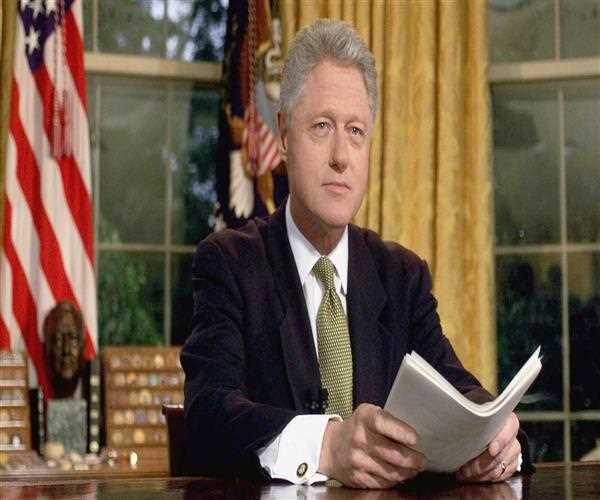
11-Apr-2024 , Updated on 4/11/2024 10:24:35 PM
Bill Clinton | Biography, Presidency
Bill Clinton, popularly known as
William Jefferson Blythe III, was born on August 19, 1946 in Hope, Arkansas. He was faced with that hardship in his childhood because his father passed away before he was born. What is more, Clinton spent initial years of his life with his mother and stepfather, and that shaped his youth as being tough and for flying high. In spite of the fact that he was not conversant with a lot of money, He was an impeccable student and a great possessed political mentality during his early age.
Aside from the fact that he was an outstanding student at Georgetown, he was the one who led the university, and more so at Oxford University where he was a Rhodes Scholar. These achievements gave a good grounding to pursue public services. On completion of his Yale University law degree in 1973, one's career of Clinton was destined to be unusual, leaving an evidence in the face of American politics for decades ahead.
Political Career
Clinton's political career started in Arkansas when he became the Attorney General then ended up being elected Governor in 1978. His governorship period had a pragmatic approach to governance that was characterized by the issues of economic development, education reform and social needs. Nevertheless, the setback did not remain there for long.
He won the election in 1982 and then three succeeding elections, earning himself a name as a genuine and effective leader. His association with the Democratic Leadership Council already created a centrist image for him, where he promoted policies that were not only accepted by the party but also widely supported amongst the voters.
Presidential Elections and First Presidential.
In 1992, Clinton ran for the presidency campaign and won, surprising most people, when he defeated incumbent George Bush and independent candidate Ross Perot. Economic development, healthcare reform, and social progress were the main themes of his candidacy. Nevertheless, that did not mean that his journey to the presidency came without its own obstacles. The first years of his presidency were not free of questions, the Watergate scandal and his health insurance reform problems among the first mentioned cases.
However, despite the above failures, he does have some significant legislative achievements, for instance, NAFTA passing and the enactment of deficit-reduction mechanisms. His ability to undulate between difficulties and relying on public support was the result of his emotional strength and political talent.
Foreign Policy and Achievements
Among other things, it could be assumed that in his first term as President Mr. Clinton's main objectives in global diplomacy was to enhance security and stability across the world. He was indeed a key person in an arrangement that settled the conflict in Bosnia and Herzegovina and also facilitated talks between the Israelis and the Palestinians.
In addition to that, he also saw his terms in Haiti to help to restore democracy and in Kosovo, he led NATO airstrikes to stop ethnic cleansing. Thus, Clinton's endeavors showed his deep forethought of international cooperation as well as peaceful settlement of the possible conflicts, which in the end determined his public image as a prestigious status in the world diplomatic relations.
Second Term and Impeachment
In spite of the fact that he had
personal scandals such as the Monica Lewinsky affair, Clinton was re-elected in the year 1996 to become the second democratic president who won the second term after Franklin D. Roosevelt. His second term that came bring in the high level of economic growth with the budget surplus and low unemployment rates.
Yet, throughout the nine and half years of his presidency, he was only the second U.S president to be impeached in the House of Representatives in 1998. He was finally acquitted by the Senate in 1999, but the entire impeachment proceedings was a major distraction in his second term and damaged his image to some extent.
Post-Presidential Activities
Continuing his involvement in public service and philanthropy, he has served as a valuable counselor, mentor, and guide for younger leaders of the modern world. He started out the William J. Clinton Foundation, the main areas of work for which were HIV/AIDS, economical inequity, and climate change.
Clinton also had a stint working with the UN in a special envoy capacity with responsibility for disaster and humanitarian relief. His post-presidency involvement further testifies to the fact that he was determined to lead humanity in the right direction and that he had become a true world leader.
A Legacy
The presidency of Bill Clinton had a lasting effect in the field of American politics and global affairs. He successfully got elected as the US president in spite of personal and political challenges. His term saw a phase of economic growth and he dealt with both national and international problems. Provided an example of his strength-readiness and political skills when confronting problems and garnering support among the public.
While his presidency brought some level disputes, Clinton's term in public service and philanthropy has shaped him as one of the most influential persons in the history of American History.

Student
An MBA in finance imparts and improves management aptitude, inventive ability, critical thinking ability, and so forth. It offers a real-time experience that fabricates a staunch career foundation for students and working professionals. It helps them to thoroughly understand the financial sector.
Join Our Newsletter
Subscribe to our newsletter to receive emails about new views posts, releases and updates.
Copyright 2010 - 2026 MindStick Software Pvt. Ltd. All Rights Reserved Privacy Policy | Terms & Conditions | Cookie Policy